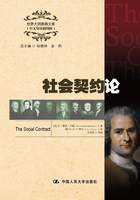
第七章 论主权者
卢梭之前的主权理论,在亚里士多德《政治学》、博丹《论共和国》、阿尔色修斯《政治学的系统考察》、格劳秀斯《战争与和平法》、霍布斯《利维坦》、普芬道夫《自然法与国家法》、洛克《政府论》中都有不同程度的阐述。卢梭则将以自然权利为基础发展而来的主权学说推到了顶峰。![参见[美]小查尔斯·爱德华·梅里亚姆著,毕洪海译:《卢梭以来的主权学说史》,北京,法律出版社,2006。](https://epubservercos.yuewen.com/C39E9A/15653222605048206/epubprivate/OEBPS/Images/note.png?sign=1734246103-jNjDVhTmWvV7w65rISnbUoz0hB7eRBg4-0-a6f36f80e94bee0a5ed1b543d1820b01)
卢梭在陈述社会契约时,对理想社会契约做了三条补充解释,要求每个个人的转让是彻底的、无条件的,并且是向全体而不是某一个个人转让,这意味着没有任何人滞留在社会契约建立的秩序之外,没有任何人滞留在法律之外,主权者是全体个人联合起来的整体,没有与组成其的个人相反的利益,对任何一个成员的伤害就是对共同体的伤害。卢梭认为,每一个参与订约之人都有双重身份,他既是主权者的一个成员,又是国家的臣民。臣民有与公意相反或不相同的个人意志,与作为组成主权者的个人是有区别的,不能将两者混同。
此外,契约中还应当有强制力的规定,保证其能够有效执行。卢梭指出,这种强制力使每个公民拥有国家,从而保护他免于一切人身依附的条件。谁拒不服从公意,全体将强迫他服从,这不过是说人们强迫他自由而已。有些学者引用此句来证明:卢梭的学说是极权主义的,至少隐含极权主义。对此,吉尔丁认为这种指控不具有合理证明效果。这顶多是一种爱国主义,而仅依据爱国主义则不足以推断卢梭是极权主义者。![参见[美]吉尔丁著,尚新建、王凌云译:《设计论证——卢梭的〈社会契约论〉》, 51页,北京,华夏出版社,2006。](https://epubservercos.yuewen.com/C39E9A/15653222605048206/epubprivate/OEBPS/Images/note.png?sign=1734246103-jNjDVhTmWvV7w65rISnbUoz0hB7eRBg4-0-a6f36f80e94bee0a5ed1b543d1820b01) 卢梭在这里强调的自由,是指服从人们为自己制定的法律,才能自由。而使法治成为可能的力量,同样使自由成为可能。
卢梭在这里强调的自由,是指服从人们为自己制定的法律,才能自由。而使法治成为可能的力量,同样使自由成为可能。
与卢梭相比,霍布斯的主权者拥有使用权力的绝对自由和至高无上的权力,并且不受法律的约束。霍布斯认为,为摆脱充满战争的自然状态,获得和平与安全,人们开始相互订立契约,奉献出除自我保存、生命安全等基本权利以外的所有权利,并指定一个人或一个由多人组成的集体来代表他们的人格。对于主权者,霍布斯一直强调可以是个人,也可以是某个集体,其数量可以区分成三种国家形式:主权者为一个人的君主制国家、主权者由部分人组成的贵族制国家和主权者由所有人组成的民主制国家。他认为君主制是最好的国家形式。洛克则认为,人们只是把一部分权利转让出来,由社会委托立法机关或指定专门人员,按照社会全体成员的共同意愿来行使权力。洛克认为,个人权利是一切权力的基础,自然权利亦优先于政治权力,国家或政府行使的权力源于其成员通过契约让渡的那部分权利。国家并没有其自身的目的,它是人们为了实现自身安全与福利而创造出来的一种工具,国家的权力及其一切活动必须忠实于这一目的并以此为限度,否则国家权力的运行就成为非法的活动。
7. THE SOVEREIGN
THIS formula shows us that the act of association comprises a mutual undertaking between the public and the individuals, and that each individual, in making a contract, as we may say, with himself, is bound in a double capacity; as a member of the Sovereign he is bound to the individuals, and as a member of the State to the Sovereign. But the maxim of civil right, that no one is bound by undertakings made to himself, does not apply in this case; for there is a great difference between incurring an obligation to yourself and incurring one to a whole of which you form a part.
Attention must further be called to the fact that public deliberation, while competent to bind all the subjects to the Sovereign, because of the two different capacities in which each of them may be regarded, cannot, for the opposite reason, bind the Sovereign to itself; and that it is consequently against the nature of the body politic for the Sovereign to impose on itself a law which it cannot infringe. Being able to regard itself in only one capacity, it is in the position of an individual who makes a contract with himself;and this makes it clear that there neither is nor can be any kind of fundamental law binding on the body of the people—not even the social contract itself. This does not mean that the body politic cannot enter into undertakings with others, provided the contract is not infringed by them; for in relation to what is external to it, it becomes a simple being, an individual.
But the body politic or the Sovereign, drawing its being wholly from the sanctity of the contract, can never bind itself, even to an outsider, to do anything derogatory to the original act, for instance, to alienate any part of itself, or to submit to another Sovereign. Violation of the act by which it exists would be self-annihilation;and that which is itself nothing can create nothing.
As soon as this multitude is so united in one body, it is impossible to offend against one of the members without attacking the body, and still more to offend against the body without the members resenting it. Duty and interest therefore equally oblige the two contracting parties to give each other help; and the same men should seek to combine, in their double capacity, all the advantages dependent upon that capacity.
Again, the Sovereign, being formed wholly of the individuals who compose it, neither has nor can have any interest contrary to theirs; and consequently the sovereign power need give no guarantee to its subjects, because it is impossible for the body to wish to hurt all its members. We shall also see later on that it cannot hurt any in particular. The Sovereign, merely by virtue of what it is, is always what it should be.
This, however, is not the case with the relation of the subjects to the Sovereign, which, despite the common interest, would have no security that they would fulfil their undertakings, unless it found means to assure itself of their fidelity.
In fact, each individual, as a man, may have a particular will contrary or dissimilar to the general will which he has as a citizen. His particular interest may speak to him quite differently from the common interest: his absolute and naturally independent existence may make him look upon what he owes to the common cause as a gratuitous contribution, the loss of which will do less harm to others than the payment of it is burdensome to himself; and, regarding the moral person which constitutes the State as a persona ficta,because not a man, he may wish to enjoy the rights of citizenship without being ready to fulfil the duties of a subject. The continuance of such an injustice could not but prove the undoing of the body politic.
In order then that the social compact may not be an empty formula, it tacitly includes the undertaking—which alone can give force to the rest—that whoever refuses to obey the general will shall be compelled to do so by the whole body. This means nothing less than that he will be forced to be free ; for this is the condition which, by giving each citizen to his country, secures him against all personal dependence. In this lies the key to the working of the political machine; this alone legitimises civil undertakings, which, without it, would be absurd, tyrannical, and liable to the most frightful abuses.
; for this is the condition which, by giving each citizen to his country, secures him against all personal dependence. In this lies the key to the working of the political machine; this alone legitimises civil undertakings, which, without it, would be absurd, tyrannical, and liable to the most frightful abuses.